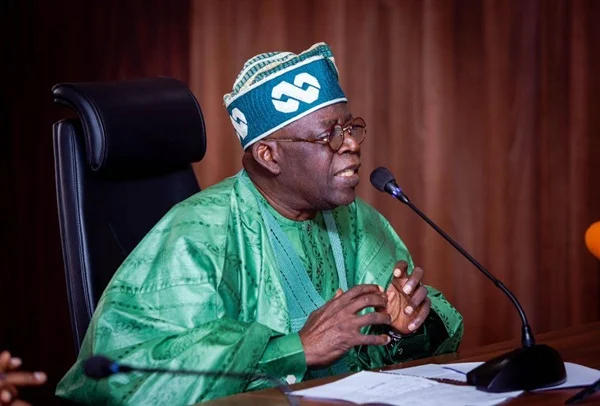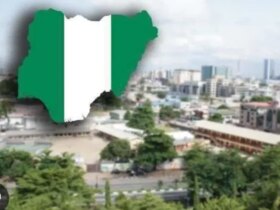Council of State Poised to Confirm Tinubu’s INEC Chair Nominee This Thursday

President Bola Tinubu is anticipated to unveil his nominee for the chairmanship of the Independent National Electoral Commission (INEC) at the upcoming National Council of State meeting scheduled for this Thursday at the Presidential Villa in Abuja, barring any unforeseen developments.
The current INEC chairman, Professor Mahmood Yakubu, is set to complete his tenure next month. Notably, on Tuesday, October 7, 2025, Yakubu formally handed over responsibilities to the senior-most National Commissioner, Dame May Agbamuche-Mbu, signaling the commencement of his transition out of office.
Among the trio of candidates under consideration, Professor Joash Ojo Amupitan, a distinguished academic from Kogi State, stands out as the frontrunner, having received strong endorsements and is widely expected to be President Tinubu’s selection.
Insiders from the presidency have revealed to Vanguard Online that Amupitan has already passed through rigorous security vetting in preparation for his potential appointment.
Born on April 25, 1967, in Aiyetoro-Gbede within Kogi State’s Ijumu local government area, Amupitan currently serves as the Deputy Vice-Chancellor (Administration) at the University of Jos. He is a Professor of Law specializing in Evidence Law, Corporate Governance, Corporate Law, and Privatisation Law.
A source close to the presidency emphasized that President Tinubu has taken a keen and deliberate interest in the selection process, underscoring the importance of appointing a chairman who will uphold the commission’s credibility and public confidence.
According to an insider familiar with the President’s thinking, Tinubu’s choice reflects a broader commitment to revitalizing trust in Nigeria’s electoral system.
“His earlier directive to involve NYSC members in supporting the upcoming census was not merely a cost-saving measure but a strategic move to enhance the process’s integrity,” the source explained.
“Similarly, the appointment of the new INEC chairman is being approached with the same emphasis on transparency and credibility to safeguard Nigerians’ trust in the electoral body.”
Another informant disclosed that the President faced considerable lobbying from powerful political figures advocating for their preferred candidates for the INEC chairmanship.
“Many of these political actors are motivated by self-interest, seeking to control INEC’s operations, influence contract allocations, and secure financial benefits,” the source revealed.
Despite these pressures, President Tinubu reportedly maintained a composed and measured stance throughout the selection process.
It was also learned that Tinubu consulted with the APC National Chairman, Professor Nentawe Yilwatda, a former Resident Electoral Commissioner for Benue State, who provided institutional advice while consciously avoiding any actions that might be perceived as undue interference.
LEADERSHIP notes that Tinubu’s swift action contrasts sharply with the delay experienced during former President Muhammadu Buhari’s administration, which took nearly four months to appoint a substantive INEC chairman following Professor Attahiru Jega’s departure in 2015.
That delay sparked controversy when Buhari initially appointed Mrs. Amina Zakari, a relative, as Acting INEC Chair over the senior-most commissioner, Ambassador Ahmed Wali, igniting nationwide allegations of nepotism.
Professor Yakubu eventually succeeded Jega in October 2015, overseeing the 2019 and 2023 general elections, both of which faced criticism over irregularities, including issues related to the BVAS and IReV systems.
By acting promptly, analysts suggest that Tinubu aims to prevent the institutional stagnation that marred Buhari’s early tenure and to project a firm commitment to conducting credible elections.
A senior government official highlighted that the President recognizes the international prestige associated with transparent elections, citing the global respect earned by former Presidents Goodluck Jonathan, Abdulsalami Abubakar, and Olusegun Obasanjo for their stewardship of fair electoral processes.
“These examples underscore the vital importance of election integrity and the reputation of the leader under whose administration such elections occur,” the official added.
Meanwhile, reports indicate that Yakubu’s discreet departure may have been accelerated by controversies surrounding the registration of new political parties.
INEC, under Yakubu’s leadership, recently approved the registration of approximately a dozen new parties from over 110 applications. However, one of these newly registered parties reportedly became a political fallback for a prominent figure in the South East, leading to grievances from a sitting governor and subsequent intervention from Abuja.
Following this, Yakubu was instructed to hand over to Agbamuche-Mbu, effectively initiating his exit from the Commission.
In accordance with Section 153(1) and the Third Schedule of the 1999 Constitution (as amended), the President is required to appoint INEC officials in consultation with the National Council of State, with confirmation by the Senate.
Nonetheless, civil society organizations such as the Socio-Economic Rights and Accountability Project (SERAP) have previously criticized President Tinubu for allegedly appointing known APC members as INEC commissioners without full consultation with the Council.
The anticipated presentation on Thursday, if it proceeds as planned, will not only fulfill constitutional requirements but also signal Tinubu’s commitment to due process and the restoration of public confidence in Nigeria’s electoral system.
Should Professor Joash Amupitan be confirmed, he will become the sixth substantive INEC chairman since 1999, succeeding Professor Mahmood Yakubu, who has led the commission since 2015.







